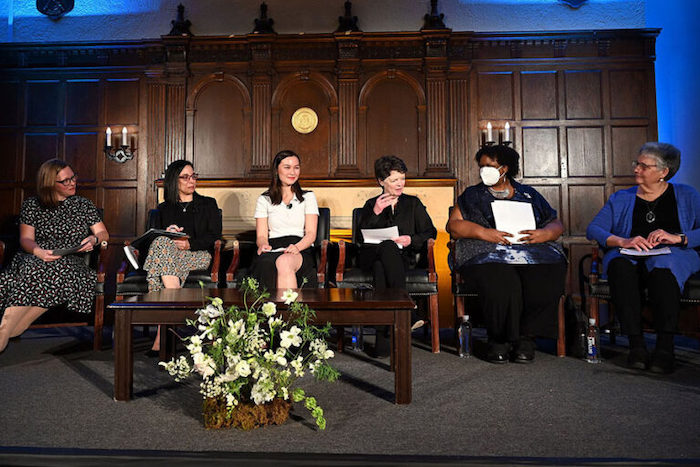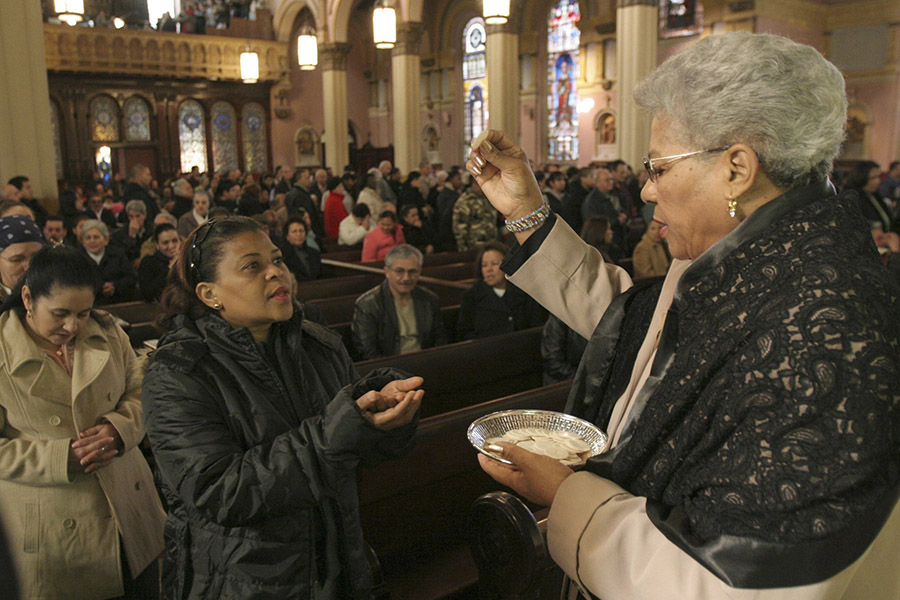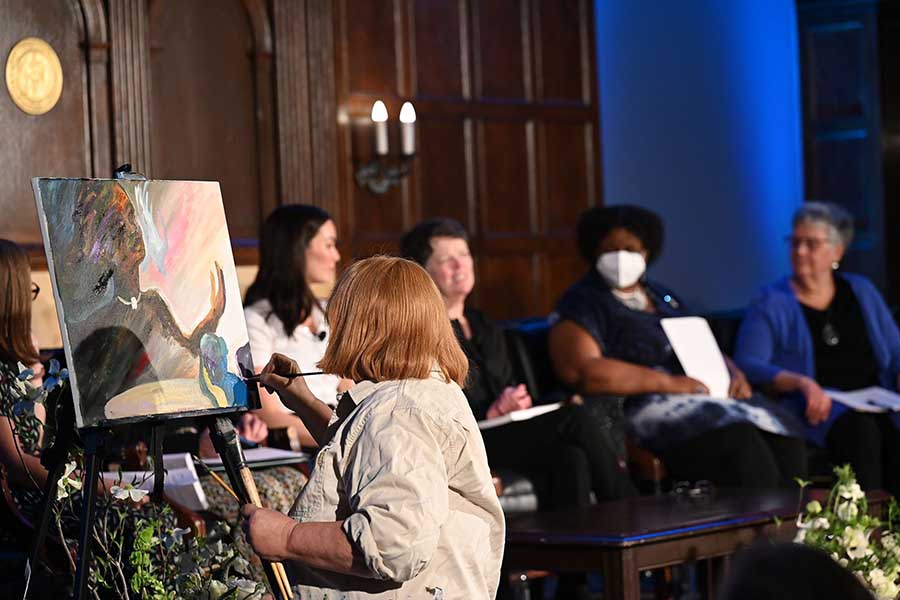
A Georgetown panel considered “the question of women’s ordination” April 17, describing the matter as “unfinished” despite Pope Francis’ current teaching and St. John Paul II’s 1994 teaching that Jesus Christ reserved the sacred priesthood to men alone even as the Lord promoted the dignity of women.
In the panel discussion titled “Faith, Feminism, and Being Unfinished: The Question of Women’s Ordination,” participants described the sole ordination of men as exclusionary of women, characterizing it as an example of a patriarchy holding on to power.
Sister Celeste Mokrzycki, a Sister of St. Joseph and chaplain for Georgetown’s School of Health and the School of Nursing, painted a picture during the event that its webpage called “the movement of the Spirit among participants.”

The end result was a depiction of a woman as a priest.
“This painting is a reminder we are all always in progress,” Annie Selak, associate director of the Georgetown University Women’s Center, said. “There are few things that are fixed.”
Theologian Pia de Solenni, a former chancellor for the Diocese of Orange, Calif., who did not participate in the Georgetown panel, said while the church should work to include religious and laywomen in leadership roles, its teaching is fixed on the matter of ordination.
“The gender or sex matters,” de Solenni said. “It’s significant. This person is the bridegroom to the church.”
Discussions about the concept of women’s ordination have increased in recent decades as women in many nations and societies have gained a more equal status to men in civil society.
However, Pope Francis has said that “the last word is clear,” on the church’s position on the concept of female priests, while expressing support for “the feminine dimension of the church.” He pointed to St. John Paul’s 1994 apostolic letter “Ordinatio Sacerdotalis,” which said that sacred priesthood in both the Catholic and Orthodox Churches “from the beginning always been reserved to men alone” in faithfulness to Jesus Christ’s plan for the church. The Holy Father also explicitly invoked his Petrine ministry to say “that this judgment is to be definitively held by all the church’s faithful.”
St. John Paul II also explained women do not have less in dignity than men, and the “presence and the role of women in the life and mission of the church … remain absolutely necessary and irreplaceable.”
However, panelist Mary Hunt, co-founder and co-director of the Women’s Alliance for Theology, Ethics, and Ritual, called the church’s limitation of the priesthood to those who are biologically male “dated at best” as society shifts its understanding of gender.
“How can we share the power?” she asked with respect to making women priests. “Yes, women and nonbinary people want power to minister. How can we share the resources of the institutional church that belong to all of us?”

Panelists suggested women’s ordination would be more inclusive and lead to changes in the church in the areas of financial mismanagement or sexual abuse.
Teresa Delgado, dean of St. John’s College of Liberal Arts and Sciences and professor of theology and religious studies at St. John’s University, suggested women’s ordination would make the church “focused less on the doctrinal and more on popular religiosity” and help “decolonialize” the church.
Some panelists suggested the church’s teaching against intentional abortion is rooted in women’s exclusion from the priesthood.
After the U.S. Supreme Court’s June decision in Dobbs v. Jackson Women’s Health Organization, novelist Alice McDermott said she saw her own presence in church that following Sunday “as a kind of collusion, a collusion with misogyny, with hypocrisy, with the conviction that to be female is to be deemed to be the lesser, less complex, less moral, less valuable, less worthy.”
The Catholic Church teaches that all human life is sacred and must be respected from conception to natural death and, as such, opposes direct abortion as an act of violence that takes the life of the unborn child. The same teaching that human life is sacred from conception to natural death also guides the church’s opposition to practices like physician assisted suicide and the death penalty. In the wake of the Dobbs ruling, the U.S. bishops have reiterated the church’s commitment to serving both women and unborn children.
De Solenni described the notion of the priesthood as power as being an example of the abuses of clericalism, and a violation of church teaching, arguing “the catechism is clear that the priest is a servant.”
“The other Sunday, we had the Gospel reading about Jesus washing the feet of the disciples,” she said. “I mean, he was modeling what it means to be a servant; only the lowest servant would wash somebody’s feet. So if you look at this as power, it’s upside down.”
The Gospels demonstrate the crucial role of women in Christ’s earthly ministry, de Solenni said, noting Mary of Bethany washes the feet of Christ shortly before he washes the feet of his apostles.
De Solenni also noted, “His mother’s Fiat precedes his Fiat in the Garden of Gethsemane,” she said.
De Solenni also rejected the argument that church teaching sees women as inferior to men.
“The church teaches that men and women are fundamentally equal,” she said. “So there’s clericalism and other abuses — and yes, there’s a lived experience where women have not been treated as equals — but that is not what the church teaches.”
Complete Article ↪HERE↩!
